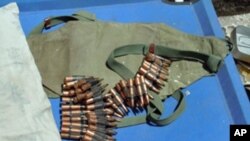In Somalia, as in other conflict areas, civilians have suffered the most. Besides being caught in the crossfire, they’ve been forced from their homes and faced drought and starvation with little aid available. A new report says Somalis want the warring parties to understand the damage that’s been done to life and property.
The report is a joint effort by CIVIC, a Washington-based NGO, and the U.N. refugee agency, UNHCR.
“When I was in Somalia earlier this year and I visited Mogadishu with AMISOM forces, you know, I looked around and thought, I never thought it was this bad,” said Sarah Holewinski, executive director of CIVIC.
AMISOM is the African Union’s mission in Somalia. Its mandate calls for stabilizing the situation in the country to allow for humanitarian operations. Holewinski said the conflict has taken its toll on the Somali capital.
“Bombed out buildings and civilians huddled underneath roofs to avoid mortars coming from al Shabab. It is one of the worst places I have ever visited,” she said.
The U.S. has labeled al-Shabaab terrorist group. It has battled forces loyal to the Transitional Federal Government. The group is currently the target of a Kenyan military offensive, following a number of terrorist attacks in Nairobi. Hundreds of thousands of Somali refugees have fled to Kenya.
What’s been missing
Holewinski said it was obvious that humanitarian assistance was needed immediately, but something else was missing. That something was the voice of the Somali people.
“What do the Somali people want when their homes have been bombed or they’re injured or they’ve had loved ones killed, including breadwinners? And so we took the past months to really investigate that in Mogadishu, in the displaced persons camps, and figure out the perspective of the Somali people and be able to bring that to the African Union and of course the other warring parties that are there,” she said.
More than 100 Somalis were interviewed for the report called Civilian Harm in Somalia: Creating an Appropriate Response. Holewinski said, “Nothing will be able to bring back what the Somalis have lost.”
She added, “consider yourself in an armed conflict and your mother or father is killed or one of your children. Or you have an injury now, which means you can’t drive that taxi that you used to or you can’t go to the factory to work. Or your house has been bombed and it’s been in your family for 50 years. Those are things that can never be given back. What can be given back to some extent is dignity.”
Seeking justice
The report calls on warring parties to never intentionally target civilians. Al-Shabab has been accused of using human shields in Mogadishu. Holewinski said warring parties should make amends.
“It means making sure that when you have caused harm you figure out what that harm is. You investigate it. You apologize. You give the family an explanation and then you make some sort of tangible amends, which can be compensation. It can be livestock. It can be the rebuilding of a home. You can’t bring the family back to normal, but you can recognize their losses in a way that is meaningful in their lives,” she said.
She said the Somalis want justice, but justice that’s in line with Somali culture and tradition.
“We talked with, for example, a man who had been injured and lost his son. He was not the kind of angry that I would be if that had happened to me. Rather, what he said was, look, we’ve got these traditional mechanisms in Somalia for conflict resolution, whether it’s based on Sharia, Islamic law – whether it’s based on some particular clan culture’s law for conflict resolution. I’d like to see the warring parties use those mechanisms and somehow recognize my losses,” she said.
Women usually bear the brunt of the conflict, after the men in their lives leave to fight or risk their lives trying to find food and are killed. They have children to care for and few options. Some are forced to marry an uncle, for example.
This year, many Somali women walked for days to escape drought and famine. Many had to leave dying children along the way. Holewinski says had it not been for security problems, many more lives might have been saved.
She said while she can give the report’s proposals to AMISOM, she admits it’s unlikely al-Shabab would even consider them.
“With al-Shabab, the only thing that I can say to them is stop targeting civilians. Abide by international law. Once we get to that point, that baseline point, then we can start talking about actually dignifying civilian harm,” she said.
The report says the African Union will need financial assistance and experts “to create the model mechanisms and procedures” to help return dignity to the Somali people.




